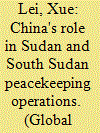| Srl | Item |
| 1 |
ID:
126384


|
|
|
| 2 |
ID:
117785


|
|
|
| 3 |
ID:
135943


|
|
|
|
|
| Summary/Abstract |
As a political concept, preventive diplomacy may trace its origin back to the era of Cold War. It was first formally presented by the late UN Secretary-General Hammarskjöld, who opined that the aim of the preventive actions taken by the relevant agencies of the UN was to fill the power vacuum existing in the area outside the sphere of influence of the superpowers. “The United Nations enters the picture on the basis of its non-commitment to any power bloc, so as to provide to the extent possible a guarantee in relation to all parties against initiatives from others.”[①] Narrowly speaking, it just refers to the work on good offices, investigation, and mediation before further escalation or deterioration of the crises or conflicts, without any reference to the deployment of military troops. In contrast, preventive diplomacy in its extensive meaning not just includes the efforts made in the early period, but also covers the peacekeeping operations led or authorized by the UN. Under some circumstances it may also include the work on post-conflict peacebuilding. Former UN Secretary-General Boutros-Ghali also made a broad definition in his Agenda for Peace as “action to prevent disputes from arising between parties, to prevent existing disputes from escalating into conflicts and to limit the spread of the latter when they occur”.[②] That said, the focus of nowadays preventive diplomacy has changed greatly from earlier times. As interpreted by Mr. Hammarskjöld, the original intent is to prevent the superpowers of the Cold War from directly intervening into conflicts breaking out in the peripheral areas outside the sphere of influence of the two blocs, in case that they may lead to direct military confrontation between the superpowers. Later the preventive diplomacy advocated by western powers actually had strong sense of interference into domestic affairs of other countries, which became an instrument of legitimation for their actions to manipulate the changes in the internal political situations in small and medium countries.
|
|
|
|
|
|
|
|
|
|
|
|
|
|
|
|